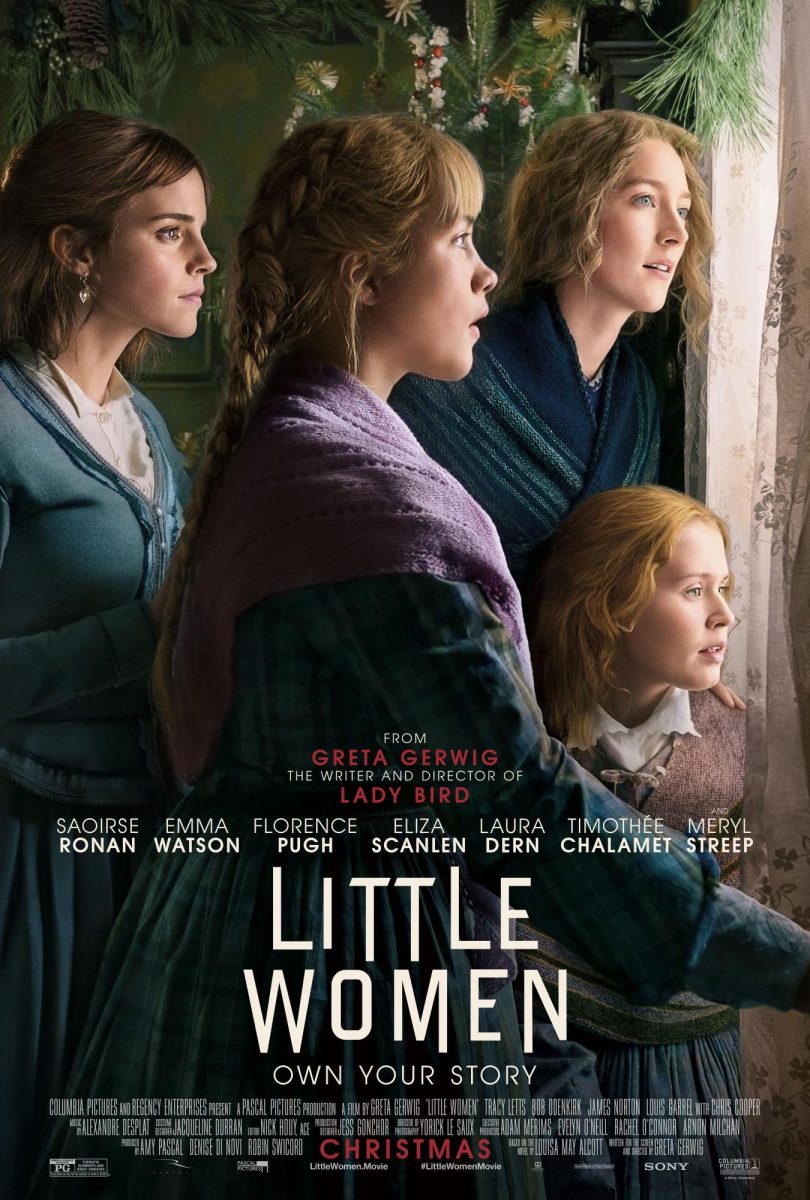This week, in the spirit of International Women’s Day, I will review one of my favorite movies of the past decade: Greta Gerwig’s “Little Women” (2019), based on Louisa May Alcott’s novel of the same name. “Little Women” is a masterful cinematic achievement that seamlessly blends the charm of the 19th-century source material with a fresh, modern perspective.
The film follows Jo March (Saoirse Ronan) and her sisters Amy (Florence Pugh), Meg (Emma Watson) and Beth (Eliza Scanlen) during the years after the Civil War as they discover who they are and where they are meant to be in society. The film also stars Timothée Chalamet as Laurie, a neighbor and friend to the March family and Laura Dern as Marmee March, the matriarch of the family.
Even with classics such as 2017’s “Lady Bird” and 2023’s “Barbie,” I believe “Little Women” is Greta Gerwig’s finest work. She demonstrates her directorial prowess with elegant framing and striking colors, which can also be credited to cinematographer Yorick Le Saux.
In addition, Gerwig does a fantastic job creating genuine and heartfelt scenes. Gerwig masterfully slows and quiets the film down when necessary, allowing the more emotional scenes to resonate with the audience. She also wrote the screenplay for the film, and much of what works so well about the film can also be attributed to that.
Gerwig writes the script in a non-linear structure, ingeniously weaving together the March sisters’ past and present timelines, offering a dynamic and engaging viewing experience. Her writing provides a contemporary lens through which we can appreciate the timeless themes of sisterhood, love and perseverance.
The performances in “Little Women” breathe new life into characters fully explored by previous actors, filmmakers and performers. Ronan’s portrayal of the fiercely independent Jo is particularly noteworthy, capturing the character’s determination and vulnerability with remarkable nuance.
Watson and Scanlen are great as Meg and Beth, respectively, but for me, Florence Pugh is the standout. She brings great depth, empathy and humor to a character often overshadowed in previous adaptations. She frequently adds a sense of childlike wonder to a film that can sometimes feel pretty down. The chemistry among the sisters feels honest and truthful, creating a palpable sense of camaraderie that lies at the heart of the narrative.
The technical aspects of “Little Women” are also tremendous. Alexandre Desplat creates a whimsical score that elevates many dramatic moments. Le Saux’s cinematography perfectly captures the divulging paths each sister takes with varying lighting and set design. Editor Nick Houy makes a two-hour and 15-minute runtime feel brisk. Lastly, Jacqueline Durran’s accurate and authentic costume design grounds the world in which it is set and does an excellent job of separating the March family from the rest of society.
In addition to its technical and narrative merits, Gerwig’s “Little Women” captures the essence of Alcott’s original work while injecting it with a modern spirit. By emphasizing the agency of the female characters and exploring themes of self-discovery and ambition, Gerwig delivers a “Little Women” for the 21st century — one that can be rewatched and discovered by generations to come.























































































































